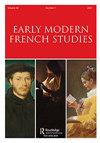探访地方:我们还能成为早期的现代人吗?2022年7月5日至7日,圣安德鲁斯,早期现代法国研究学会早期现代法国会议主题演讲
IF 0.2
3区 历史学
Q2 HISTORY
引用次数: 0
摘要
本文用当代生态理论阐释了早期现代诗歌的地位。作者调动了ικις的联系,而不是环境的分离,追溯了杜贝莱、雅克·佩莱蒂尔和朗萨诗歌中的生态位置感,并从后人文主义的批评者那里重新获得了文艺复兴时期的人文主义。人文田园诗体现了一种连接感,这种连接感被称为当代概念的范畴,如自然文化或跨企业。文艺复兴时期的地方,作为一种生态思维习惯,与现代对荒野的崇敬形成了鲜明的对比,后者将人与环境分隔开来。这一结论表明,文艺复兴时期的人文主义和我们的学术人文主义之间是连续的,因为它们优先考虑关系价值体系,而不是获取或榨取的价值体系。该文本是2022年SEMFS会议主题演讲的修改版本,其中引用了一些本着存档精神提交的论文,以激发知识空间。本文章由计算机程序翻译,如有差异,请以英文原文为准。
Revisiting Places: Can We Still Be Early Modern? Keynote Address, Early Modern French Conference of the Society for Early Modern French Studies, 5–7 July 2022, St Andrews
This article articulates the places of early modern poetry with contemporary eco-theories. Mobilising the connectivities of οικος rather than the separations of environment, the author traces ecological senses of place in the poetry of Du Bellay, Jacques Peletier, and Ronsard, and reclaims Renaissance humanism from posthumanist detractors. Humanist pastoral poetry manifests the sense of connection claimed as the purview of contemporary concepts such as naturecultures or transcorporeality. Renaissance place, as an ecological habit of thought, contrasts favourably with modern veneration of wilderness which separates human from environs. The conclusion suggests continuities between Renaissance humanism and our academic humanities inasmuch as they privilege relational, rather than acquisitive or extractive, value systems. The text is a modified version of the keynote address to the 2022 SEMFS Conference and contains references to some of the papers presented in the spirit of archiving that stimulating intellectual space.
求助全文
通过发布文献求助,成功后即可免费获取论文全文。
去求助
来源期刊

Early Modern French Studies
Multiple-
CiteScore
0.10
自引率
0.00%
发文量
14
期刊介绍:
Early Modern French Studies (formerly Seventeenth-Century French Studies) publishes high-quality, peer-reviewed, original articles in English and French on a broad range of literary, cultural, methodological, and theoretical topics relating to the study of early modern France. The journal has expanded its historical scope and now covers work on the sixteenth, seventeenth, and eighteenth centuries. Within this period of French literary and cultural history, the journal particularly welcomes work that relates to the term ''early modern'', as well as work that interrogates it. It continues to publish special issues devoted to particular topics (such as the highly successful 2014 special issue on the cultural history of fans) as well as individual submissions.
 求助内容:
求助内容: 应助结果提醒方式:
应助结果提醒方式:


